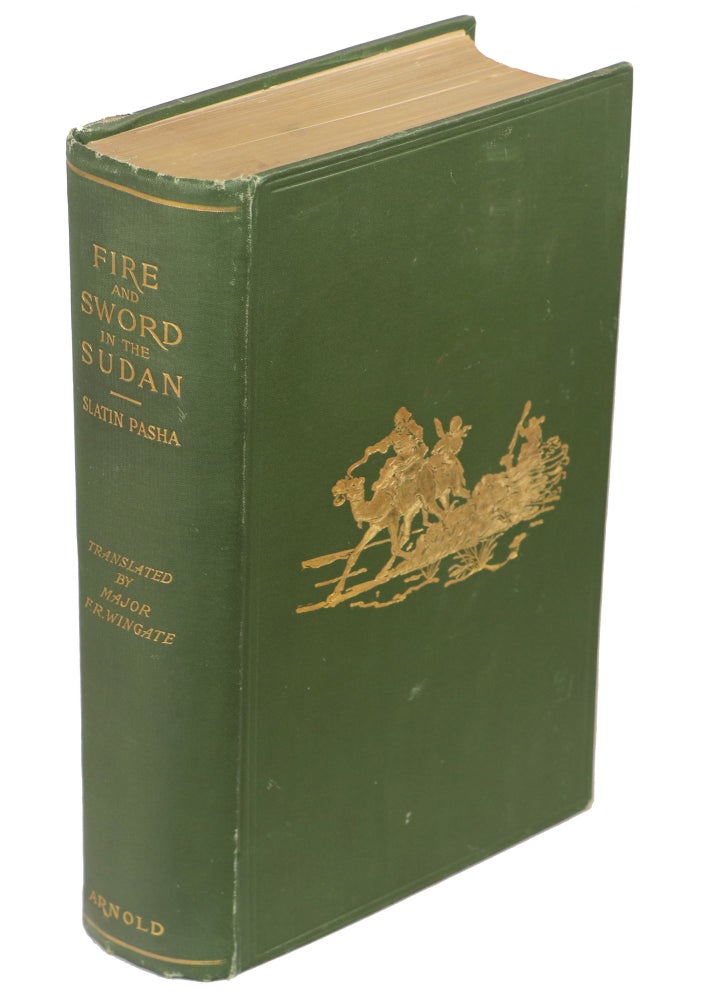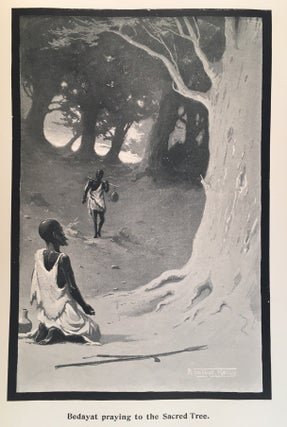Fire and Sword in the Sudan; A Personal Narrative of Fighting and Serving the Dervishes 1879-1895
London: Edward Arnold, 1896. First edition. Hardcover. Large 8vo. [7], viii-xviii, [2], 636, [2] pp. Green cloth with gold lettering and rules on the spine, a decoration in gilt of Slatin escaping from Sudan on a camel on the front board; top edge gilt. Illustrated with a frontispiece photogravure of Rudolf C. Slatin, a color fold-out map in the rear showing Mahdist control over the region in 1895, a color fold-out plan of Khartoum, and 21 black and white plates illustrating scenes from Slatin's time as governor of Sudan, and subsequent capture and imprisonment at the hands of the Mahdists. Oxford DNB, "Slatin, Sir Rudolf Carl von". Pasha Slatin began his career in Sudan as governor of Dara, in south-western Darfur. Less than a year later he would go on to become governor-general of the whole province. In 1881, Muhammad Ahmad ibn 'Abdullahi declared himself the Mahdi of the Sudan, and with his followers escaped from Aba Island on the White Nile to the Nuba Mountains. Slatin led his troops against the uprising, a quasi civil war, as numerous tribal and religious leaders in Darfur joined the Mahdi. In early 1883 the Mahdi took al-'Ubayd, capital of Kordofan, and Darfur was cut off from Khartoum. To make a last bid at defeating the uprising, Slatin converted to Islam to increase the loyalty of his troops. When the capital of Darfur, al-Fasher, was captured, Slatin surrendered (later on in 1883). At his surrender at Dara, Slatin was renamed 'Abd al-Qadir Salatin. Slatin was prisoner to two Caliphs during 1884 until his escape in 1895. Though Slatin characterized the Caliph as cruel and beastly, he failed to mention that he was allowed to live in his old residence with servants. In 1896, Slatin's publication of this book proved extremely influential at stirring British sentiment to recapture Sudan. Later on, with the help of Colonel Reginald Wingate, Slatin and the British government would retake Sudan. Slatin's knowledge of the region and of Arabic proved helpful in the final battle at Karrari, in 1898. After this book was released, Slatin was something of a celebrity in Great Britain. He was a correspondent and friend to the Queen, visiting frequently at Windsor and Balmoral. In 1898 he was awarded a knighthood from Queen Victoria, and would go on to serve in Sudan from 1906 until 1914 and the outbreak of World War One. Though a travel and cultural narrative, this volume presents a colonialist view of Northern Africa. Although Slatin was by all accounts an imperialist, he took the time to learn Arabic and had an exceptional knowledge of the local culture. During the latter part of his career, Slatin went as far as to forbid Christian missionaries from working in Sudan, trying to appease local religious leaders and his old friends from his time as a prisoner of the Mahdi. An important record of British colonialism in the nineteenth-century, at the height of Queen Victoria's empire. Very Good+. Item #00008983
A Very Good+ book with a trace or two of wear to the extremities and a discreet tape repair to the map, leaves and plates are remarkably clean and free of foxing.
Price: $450.00


